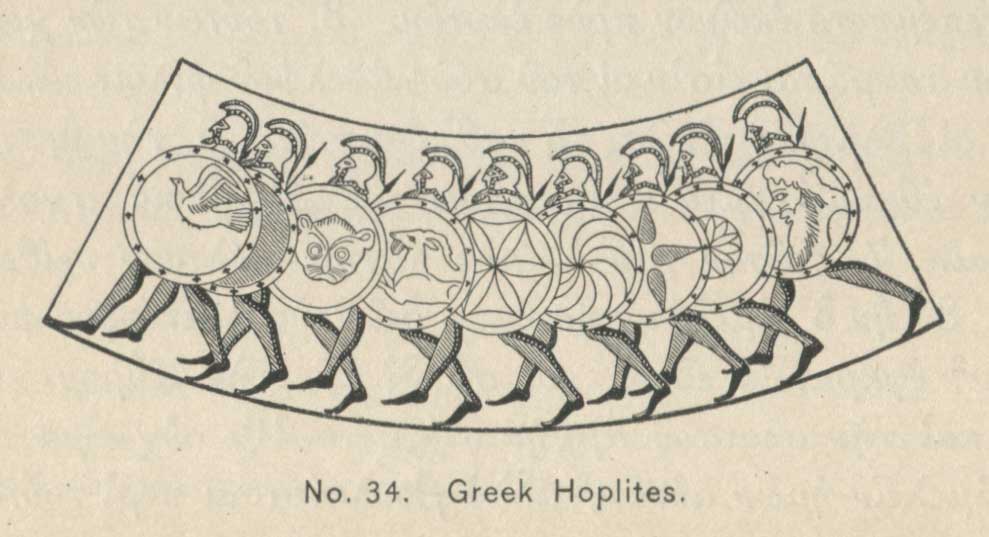THE FIRST GREEK BOOK
BY JOHN WILLIAMS WHITE, PH.D, LL.D., LITT.D.
Professor Of Ancient Greek At Harvard University
This Revision Copyright ©2012 by Shawn Irwin
Lesson XLVIII - Reflexive, Reciprocal, and Possessive Pronouns
S443. The reflexive pronouns are ἐμαυτοῦ, of myself, σεαυτοῦ,
of yourself, ἑαυτοῦ, ἑαυτῆς, ἑαυτοῦ, of himself, herself, itself.
S444. Learn the declension of these pronouns in 760.
S445. The reflexive pronouns are compounded of the stems of the personal
pronouns (759) and αὐτός. But in the plural the two pronouns
are declined separately in the first and second persons.
S446. The reflexive pronouns refer to the subject of the clause in which they
stand. sometimes in a dependent clause they refer to the subject of the leading verb, i.e. they are indirect reflexives. Thus,
ἀφιππεύει ἐπὶ τὴν αὐτοῦ σκηνήν,
he rides away to his own quarters;
ἐκέλευσε Κῦρος τὸν ἀρίστιππον ἀποπέμψαι πρὸς ἑαυτὸν τοὺς στρατιώτᾱς,
Cyrus ordered Aristippus to send the soldiers to him.
S447. Learn the declension of the reciprocal pronoun ἀλλήλων,
of one another, in 761.
S448. The possessive pronouns are ἐμός, my, σός,
your, ἡμέτερος, our, ὑμέτερος, your. They are formed
from the stems of the personal pronouns (759), and are declined like adjectives in ος (750).
S449. VOCABULARY.
ἀλλήλων, (compare ἄλλος), recipricol pronoun, of one another.
ἀμελέω, ἀμελήσω, etc., be careless, neglect.
ἀφιππεύω, ἀφιππεύσω, (compare ἵππος), ride back, return on horseback.
ἑαυτοῦ, ῆς, οῦ, (see 445), reflexive pronoun, of himself, herself, itself.
ἐμαυτοῦ, ῆς, (see 445), reflex. pronoun, of myself·
ἐμός, ή, όν, (see 448), poss. pronoun, my, mine.
ἡμέτερος, ᾱ, on (see 448), our.
σεαυτοῦ, ῆς, (see 445), reflexive pronoun, of yourself.
σός, σή, σόν, (see 448), possessive pronoun, your.
σχολαίως, (compare σχολή), adverb, slowly.
ὑμέτερος, ᾱ, on (see 448), possessive pronoun, your.
S450.
1. ἐπὶ τὴν ἐμαυτοῦ σκηνὴν ἀφιππεύσω.
2. Κῦρος δὲ μετεπέμπετο ἐκεῖνοn πρὸς ἑαυτόν.
3. τούτων τῶν χωρίων πάντων σατράπαι εισὶν οἱ τοῦ σοῦ ἀδελφοῦ φίλοι.
Nouns with a possessive pronoun take the article when they refer to definite individuals (809).
4. λέγει δὲ ὅτι οἱ Ἕλληνες νῑκῶσι τό καθʼ ἑαυτούς.
5. τὴν ὑμετέραν ἀρετὴν ἐθαυμάσαμεν.
6. ἐβόων δὲ ἀλλήλοις σχολαίως ἔπεσθαι.
7. τοῦτον γὰρ ὁ ἐμὸς πατὴρ εκέλευσε πείθεσθαι ἐμοί.
8. ἦν δ᾽ ἡμεῖς νῑκήσωμεν, δεῖ τοὺς ἡμετέρους φίλους τούτων ἐγκρατεῖς εἶναι.
For the genitive, compare 430, 4.
9. συ δὲ νῦν τὴν Κύρου χώρᾱν ἔχεις καὶ τὴν σεαυτοῦ ἀρχὴν σῴζεις.
10. οὑχ ὥρᾱ ἐστὶν ἡμῖν ἀμελεῖν ἡμῶν αὐτῶν ἀλλὰ βουλεύεσθαι περὶ τούτων.
The genitive follows verbs signifying to neglect (846).
S451.
1. You have your own province.
2. They carried on war with one another.
Use the dative (864).
3. He gets his own soldiers together.
4. They feared that you would neglect yourselves.
5. It is time for us to deliberate in our own behalf.
S452. Clearchus advances against Menon's Troops.
ὁ δὲ Κλέαρχος καταφεύγει εἰς τό ἐαυτοῦ στράτευμα, καὶ εὐθὺς
παραγγέλλει εἰς τὰ ὅπλα˙ καὶ τοὺς μὲν ὁπλίτᾱς αὐτοῦ ἐκέλευσε
μένειν, τὰς ἀσπίδας πρὸς τὰ γόνατα ἔχοντας, αὐτὸς δὲ λαβὼν τοὺς
Θρᾷκας οἳ (who) ἦσαν αυτῷ εν τῷ στρατεύματι, ἤλαυνεν ἐπὶ
τοὺς Μένωνος, ὥστ᾽ ἐκεῖνοι εφοβήθησαν καὶ αὐτὸς Μένων, καὶ
τρέχουσιν ἐπὶ τὰ ὅπλα.
αὐτοῦ: adverb, there, i.e. where they were.
τὰς ἀσπίδας ἕχοντας: the left knee was slightly advanced, the shield set firmly in
rest upon it, and the spear held in readiness for defence.
λαβὼν: literally having taken, second aorist active participle of λαμβανω.

See the route on the map.
End Of Chapter
INDEX
Chapter 49
HOME
This Revision Copyright ©2012 by Shawn Irwin
